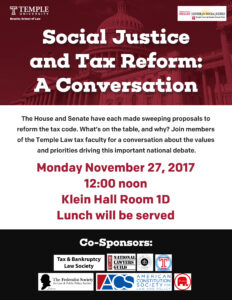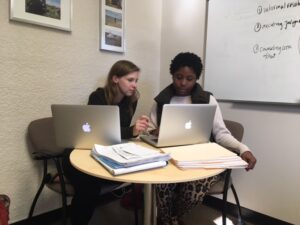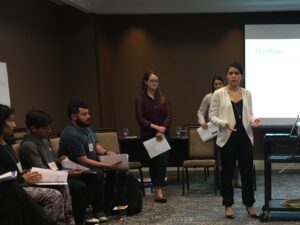Our faculty panel on Social Justice and Tax Reform, co-sponsored by the Center and six student organizations, drew a big crowd — even though it took place during the busy last days of the semester. JJ Dikmak (Law ’19) summarized the conversation for Temple’s business law magazine, The Temple 10-Q. Some clear themes emerged: the process has been too rushed, and the proposals — some version of which may become law in the next few days — appear to have serious flaws. We hope to arrange for more discussion (including a look at how these “reforms” will affect low-income taxpayers) next semester.
News
Upcoming conversation on tax reform and social justice
 What the heck is going on with tax “reform” — and what are the implications for social justice? Join a conversation on that subject, sponsored by the Sheller Center and a diverse group of student organizations, on MONDAY, NOVEMBER 27, from 12-1 pm, in Klein 1D. Faculty panelists will include Profs. Andrea Monroe, Kathy Mandelbaum, Robert Bartow, Jan Ting and Richard Greenstein. Lunch will be provided.
What the heck is going on with tax “reform” — and what are the implications for social justice? Join a conversation on that subject, sponsored by the Sheller Center and a diverse group of student organizations, on MONDAY, NOVEMBER 27, from 12-1 pm, in Klein 1D. Faculty panelists will include Profs. Andrea Monroe, Kathy Mandelbaum, Robert Bartow, Jan Ting and Richard Greenstein. Lunch will be provided.
Center’s report on affordable housing goes national
Danger of the Opt Out: Strategies for Preserving Section 8 Project-Based Housing in Philadelphia, a report prepared earlier this year by Justice Lab students Rita Burns, Sara Mohamed and Andrew Newstein for Community Legal Services, has been adapted for publication in the next issue of the American Bar Association’s Journal of Affordable Housing and Community Development Law.
According to the report, Philadelphia is at risk of losing significant numbers of affordable housing units as landlords “opt out” of the federal Section 8 program. The report recommends steps that the city should take in order to preserve as much affordable housing as possible.
Prof. Colleen Shanahan, director of Justice Lab, notes: “Cities around the country are facing affordable housing challenges. This article will allow attorneys, advocates, and policymakers around the country to learn from the Justice Lab student team’s data analysis and proposed solutions for Philadelphia.”
Guest Post: Being a prepared and flexible advocate

This guest post comes from Imani Hudson-Hill, a third-year student in the Sheller Center’s Social Justice Lawyering Clinic. Of course, guest posts reflect the personal views of the authors; we welcome a diversity of viewpoints.
My law student partner and I recently represented a client at an arbitration hearing through the Sheller Center for Social Justice’s Advanced Social Justice Lawyering Clinic. Our client was a low-wage worker who had not been paid minimum wage and overtime by her former employer, for whom she worked for seven years. Her case had been ongoing for several years and she wanted a chance for her story to be heard — regardless of the hearing’s outcome.
I was tasked with cross-examining the opposing party with an interpreter. To prepare for my cross-examination, I looked through depositions and documents, then crafted short and leading questions that I hoped would result in admissions that supported our case theory.
The thing I did not anticipate was under what circumstances I would be conducting my cross-examination. Once it was time for my cross-examination, the arbitration had been in progress for approximately four hours and the panel was noticeably impatient. I wound up cutting a significant portion of my cross-examination on the spot because the witness was unable to read the documents that I’d planned to introduce, the interpreter’s clock was running out, and the room was filled with fatigued, hungry parties and panelists. Despite having to redesign my cross-examination on the fly, we received most of the admissions that we had anticipated.
Sifting through a three-year-old case file to prepare for the hearing then deviating from my prepared examination was a daunting and intimidating process. However, attending my first arbitration hearing was an invaluable experience that taught me the importance of being a prepared and flexible advocate. In the end, the panel ruled in favor of our client and ordered the opposing party to pay her the money she rightfully deserved.
Unmasking the Problem of Temporary Employment in Pennsylvania
During Douglas Bell’s first day of work, he stepped off a township garbage truck while it was moving and sustained a fatal head injury. Bell was not an employee of the township. Rather, Bell had been placed in the job with the township by a staffing agency as a “temp” worker. Both the staffing agency and the township were aware that Bell had never ridden on the back of a garbage truck. Each expected the other to make sure Bell was prepared to perform the job that day.
Bell’s tragic death highlights the problems with temp work. In an employment relationship with three players, host employers and staffing agencies can “pass the buck” between one another, evading employer responsibilities to the detriment of the temp worker. Read more here about the increasing phenomenon of temp work in Pennsylvania and the ways in which temp workers are at special risk for workplace injury and financial harm.
Pennsylvania Workers in Jeopardy: The Hidden Problem of Temporary Employment was written by law students, Rebecca Daily, Tracie Johnson, and Holly Smith, in the Social Justice Lawyering Clinic. See today’s article in the Philadelphia Inquirer about the report.
Help with DACA
Yesterday, the federal government announced that it will phase out the DACA (Deferred Action for Childhood Arrivals) program. We’ve set up a DACA page containing information on the details of the government’s plan, how the plan will affect people who currently have DACA, and whom to contact for further help. We’ll update the page as information becomes available.
Barriers persist for non-English speakers in Pennsylvania courts
Unfinished Business, a new report from the Sheller Center for Social Justice at Temple Law School and Villanova University Charles Widger School of Law reveals that in some Pennsylvania courts, non-English speakers may not receive interpretation assistance during their hearings. This report is a follow-up study to the Sheller Center’s 2014 survey of Pennsylvania’s magisterial district judge (MDJ) courts.
The study performed court observation in 19 MDJ courts in Montgomery, Delaware, and Chester counties. It found that the majority of courts observed failed to provide certified interpreters for civil hearings. Court staff also did not consistently provide interpreters when speaking with limited English proficient individuals at the front desk nor did they uniformly provide notice of the right to language services. A minority of courts, however, were observed to provide exemplary language services.
“What is most concerning about our results is the inconsistency between courts. This means that individuals with limited English proficiency have unequal opportunities to access and participate in court matters depending on their location,” commented Anne Bonfiglio, a 3L law student and co-author of the report.
Magisterial district judge courts are Pennsylvania’s “small claims” courts. Litigants in these courts frequently do not have attorneys. Without access to adequate interpretation, non-English speaking litigants cannot understand what is happening in their court case.
The study concludes that these variations among courts came from the lack of consistent procedures and the limited accountability for courts that fail to comply with state and federal law. Further, a judge’s personal commitment to and understanding of language services directly contributed to the quality of language services provided in the courthouse.
The study comes on the heels of a comprehensive statewide Language Access Plan issued by the Supreme Court in March 2017. In order for this statewide plan to be truly effective, this report calls for statewide training of court staff and judges as well as forceful monitoring and enforcement.
Barriers persist for non-English speakers in Pennsylvania courts
Unfinished Business, a new report from the Sheller Center for Social Justice at Temple Law School and Villanova University Charles Widger School of Law reveals that in some Pennsylvania courts, non-English speakers may not receive interpretation assistance during their hearings. This report is a follow-up study to the Sheller Center’s 2014 survey of Pennsylvania’s magisterial district judge (MDJ) courts.
The study performed court observation in 19 MDJ courts in Montgomery, Delaware, and Chester counties. It found that the majority of courts observed failed to provide certified interpreters for civil hearings. Court staff also did not consistently provide interpreters when speaking with limited English proficient individuals at the front desk nor did they uniformly provide notice of the right to language services. A minority of courts, however, were observed to provide exemplary language services.
“What is most concerning about our results is the inconsistency between courts. This means that individuals with limited English proficiency have unequal opportunities to access and participate in court matters depending on their location,” commented Anne Bonfiglio, a 3L law student and co-author of the report.
Magisterial district judge courts are Pennsylvania’s “small claims” courts. Litigants in these courts frequently do not have attorneys. Without access to adequate interpretation, non-English speaking litigants cannot understand what is happening in their court case.
The study concludes that these variations among courts came from the lack of consistent procedures and the limited accountability for courts that fail to comply with state and federal law. Further, a judge’s personal commitment to and understanding of language services directly contributed to the quality of language services provided in the courthouse.
The study comes on the heels of a comprehensive statewide Language Access Plan issued by the Supreme Court in March 2017. In order for this statewide plan to be truly effective, this report calls for statewide training of court staff and judges as well as forceful monitoring and enforcement.
Responding to Charlottesville
The Temple Law Student Bar Association with the support of every Temple Law student organization and association issued a statement in response to the events in Charlottesville. We at the Sheller Center for Social Justice share that statement here in support and solidarity with Temple Law students and our broader community. We are honored to stand with these partners as we reject racism and white supremacy in all its forms and continue to work for social justice and equality in our society.
Students create Welcoming Schools Toolkit for students, parents, and educators
The Youth Organizing Project at the Pennsylvania Citizenship and Immigration Coalition (PICC) came to the Sheller Center asking for help in creating a toolkit that would help immigrant communities advocate for the policies and practices needed to create safe and welcoming schools. After the fall election, PICC was flooded with questions from parents and teachers across PA, asking whether it was safe to send their children to school and what schools could do to protect students.
 Social Justice Lawyering Clinic Students Tessa Carson (’17), Emily Diaz (’18), and Ashley Rotchford (’18) created the Welcoming Schools Toolkit. Emily Diaz states, “its purpose is to provide students, parents, and educators with the tools to advocate for schools that are committed to ensuring that all students—regardless of their immigration status—are welcome, safe, and protected in the school environment.” The toolkit offers sample resolutions and policies that represent proactive steps that schools can take to keep children safe from immigration enforcement raids, protect students’ privacy, and affirm a commitment to inclusiveness. Diaz, along with her partners, debuted the toolkit at PICC’s statewide convening in Harrisburg, Pennsylvania in May 2017.
Social Justice Lawyering Clinic Students Tessa Carson (’17), Emily Diaz (’18), and Ashley Rotchford (’18) created the Welcoming Schools Toolkit. Emily Diaz states, “its purpose is to provide students, parents, and educators with the tools to advocate for schools that are committed to ensuring that all students—regardless of their immigration status—are welcome, safe, and protected in the school environment.” The toolkit offers sample resolutions and policies that represent proactive steps that schools can take to keep children safe from immigration enforcement raids, protect students’ privacy, and affirm a commitment to inclusiveness. Diaz, along with her partners, debuted the toolkit at PICC’s statewide convening in Harrisburg, Pennsylvania in May 2017.
